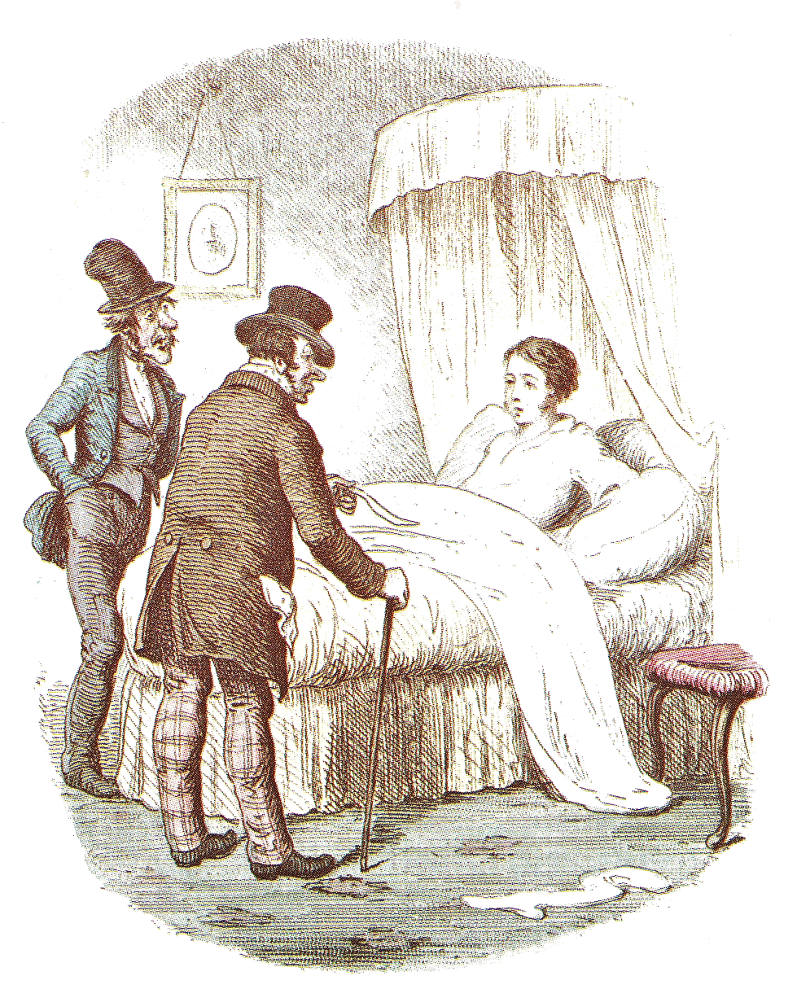

The Arrest (page 501) — fifteenth black-and-white lithograph from engraving (1885), but sixteenth hand-coloured lithograph (1979) for Charles Dickens's Great Expectations, first published in the Robson and Kerslake edition, Chapter XLVI. 3 ⅞ by 3 inches (9.6 cm by 7.6 cm), vignetted, facing p. 470.
Passage Illustrated: A Feverish Pip Confronts the Bailiffs
— these were things that I tried to settle with myself and get into some order, as I lay that morning on my bed. But the vapour of a limekiln would come between me and them, disordering them all, and it was through the vapour at last that I saw two men looking at me.
“What do you want?” I asked, starting; “I don’t know you.”
“Well, sir,” returned one of them, bending down and touching me on the shoulder, “this is a matter that you’ll soon arrange, I dare say, but you’re arrested.”
“What is the debt?”
“Hundred and twenty-three pound, fifteen, six. Jeweller’s account, I think.”
“What is to be done?”
“You had better come to my house,” said the man. “I keep a very nice house.”
I made some attempt to get up and dress myself. When I next attended to them, they were standing a little off from the bed, looking at me. I still lay there.
“You see my state,” said I. “I would come with you if I could; but indeed I am quite unable. If you take me from here, I think I shall die by the way.” [Chapter LVII, 501]
Commentary
Dickens has used such distressing scenes before, notably in Sketches by Boz when the bailiffs appear to dun a debtor in The Broker's Man (in the fifth chapter of "Our Parish," published 8 February 1836). But here the effect is anything but comic, as Pip's aristocratic tastes and carelessness about money have brought him to brink of bankruptcy, and ill-health has confined him to bed. Pailthorpe uses Pip's confrontation with the bailiffs to set the stage for Joe's timely intervention. Furniss and McLenan in their sequences focus on Joe's protracted stay in Pip's rooms, nursing him back from a debilitating illness over a number of weeks, rather than the scene with the bailiffs. Immaculately dressed in a white nightgown, Pip sharply contrasts the frowzy functionaries who cooly confront him about his debts in his very bedroom. In this penultimate illustration in Pailthorpe's program, Pip appears to have hit rock bottom, as it appears that he is now about to be consigned to Debtors' Prison, perhaps the very Marshalsea that received Arthur Clennam in Little Dorrit and in real life Dickens's own father, John, in 1824. Pailthorpe was probably aware of a rather more dramatic dunning scene entitled The Arrest, Phiz's July 1856 illustration for William Harrison Ainsworth's The Spendthrift, originally serialised in Bentley's Miscellany, in which the profligate protagonist is distrained for debt.
Related Material
- Charles Dickens’s Great Expectations
- Bibliography of works relevant to illustrations of Great Expectations
Other Scenes of Apprehension for Debt
- The Broker's Man by George Cruikshank for Sketches by Boz (1839)
- The Lock-up House by George Cruikshank for Sketches by Boz (1839)
- "I've brought this here note," replied the individual in the painted tops in a hoarse whisper; "I've brought this here note from a gen'l'm'n as come to our house this mornin'." by Fred Barnard in the Household Edition of Sketches by Boz (1876)
- Mr. Caudle is called to a Sponging-house by Charles Keene (1866) for Douglas Jerrold's Mrs. Caudle's Curtain Lectures (first published 10 May 1845)
- "Come Sir! Remove me to my vile dungeon. Where is my mouldy straw?" by Edgar Dalziel for Dickens's "Mrs. Lirriper's Legacy," in Christmas Stories.
Related Material
- Dickens's Great Expectations in Film and Television, 1917-2000
- Charles Dickens’s Great Expectations
- Bibliography of works relevant to illustrations of Great Expectations
Other Artists’ Illustrations for Dickens's Great Expectations
- Edward Ardizzone (2 plates selected)
- H. M. Brock (8 lithographs)
- J. Clayton Clarke ("Kyd") (2 lithographs from watercolours)
- Felix O. C. Darley (4 photogravure plates)
- Sol Eytinge, Jr. (8 wood engravings)
- Marcus Stone (8 wood engravings)
- John McLenan (40 wood engravings)
- F. A. Fraser in the Household Edition (29 wood engravings)
- Harry Furniss (28 plates)
- Charles Green (10 lithographs)
Scanned images and text by Philip V. Allingham. [You may use these images without prior permission for any scholarly or educational purpose as long as you (1) credit the photographer and (2) link your document to this URL in a web document or cite the Victorian Web in a print one.]
Bibliography
Allingham, Philip V. "The Illustrations for Great Expectations in Harper's Weekly (1860-61) and in the Illustrated Library Edition (1862) — 'Reading by the Light of Illustration'." Dickens Studies Annual, Vol. 40 (2009): 113-169.
Dickens, Charles. Great Expectations. Illustrated by John McLenan. Harper's Weekly: A Journal of Civilization. Volume IV: 740 through volume V: 495 (for 24 November 1860 through 3 August 1861).
_____. Great Expectations. Illustrated by Sol Eytinge, Junior. Diamond Edition. 14 vols. Boston: Ticknor & Fields, 1867. XIII.
_____. Great Expectations. Illustrated by F. A. Fraser. Volume 6 of the Household Edition. London: Chapman and Hall, 1876.
_____. Great Expectations. Illustrated by F. W. Pailthorpe. London: Robson & Kerslake, 23 Coventry Street, Haymarket, 1885.
_____. Great Expectations. Illustrated by H. M. Brock. Imperial Edition. 16 vols. London: Gresham Publishing Company [34 Southampton Street, The Strand, London], 1901-3.
_____. Great Expectations. Illustrated by Harry Furniss. Charles Dickens Library Edition. 18 vols. London: Educational Book Company, 1910. XIV.
Harmon, William, and C. Hugh Holman. "Picaresque Novel." A Handbook to Literature. Upper Saddle River, NJ: Prentice Hall, 2000. Pp. 389-390.
Paroissien, David. The Companion to Great Expectations. Westport, Conn.: Greenwood, 2000.
Created 23 September 2021 Last updated 6 October 2021